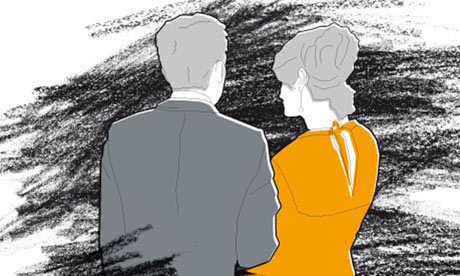
I learn of the relapse at two minutes past midnight. Four months of sobriety over, just like that. My husband's work phone – the one he left behind – rings loudly and I find it at the foot of the bed. I see the time beside the name: Pete. Usually when someone calls so late it's a mistake or an emergency.
This is strange because R is meant to be in Cornwall with Pete – a friend he hasn't seen for years – on a climbing holiday. He left on a train yesterday morning.
I answer in a whisper, careful not to wake the children in the adjoining bedrooms. "Hello, Pete." I don't know him that well and I am conscious that my greeting is stiff: how should I sound? Concerned? Or breezy and upbeat, as though I'm talking over the fence to my neighbour. Under the circumstances, I think it's all right to appear a little bemused.
"Sorry. You've answered, so R's obviously left this phone at home." Pete stops. I presume he is worried that he'll say something that will land his friend in trouble, or cause me to feel troubled, which is touching. I immediately want to put him at ease, so I talk.
"So he's not picking up his other phone, right?"
"Yeah. It's just going straight to voicemail. He went out this morning to get coffee and I haven't heard from him since," says Pete.
R is drunk. I could give him the benefit of the doubt, but when he goes on a binge he often turns off his phone and disappears.
Pete continues. "He arrived on the train yesterday afternoon. He was so pissed he could barely talk, so I took him back to mine and put him to bed."
It transpires that R arrived two days earlier than the climbing holiday was due to start. "I told him I had to work, but he said he wanted to explore the area," Pete says.
I begin to piece together R's cunning plan: he had convinced me that the holiday was a week rather than five days, so that he could have two days spare to get wasted.
I have the urge to apologise to Pete. Immediately I feel as if I'm speaking to one of my daughter's new teachers: they sometimes call to inform me that she is misbehaving in class. They are usually kind, but often reticent about disclosing all the details, for fear that I might be upset. But I am familiar with most of her ways and I don't want to sound ungrateful by informing them that anything they are telling me is stuff I've probably witnessed firsthand before.
But R is an adult. I sometimes forget this and I want to cover up the bad things with a blanket of my own "fix-this-mess" remorse. He often doesn't appear to feel any, though deep down I know this is not the case.
In all our years together, the things R does when he drinks – which at best cause others mild inconvenience and at worst seem dangerous and disrespectful – are the things he is usually too drunk to notice. When he is sober again, he is either too ashamed to conjure up any memory of his behaviour, or was too far gone at the time to have any recollection of what he said or did.
I am a born apologist and have said sorry for R more times than is healthy. "I'm so sorry. R is a nightmare when he drinks." I genuinely feel sympathy for Pete, if only because their climbing holiday probably won't happen.
In this strange, reveal-all conversation, Pete admits that he knew nothing of R's problem. "He drank loads when we worked together, but I thought, with a family, he'd slowed down."
Again, R has failed to communicate anything to anyone.
The frustration with R is bigger than my worry for his safety. Yes, I can visualise a ditch, and him in it, but then I remember that R's usual style is to park himself in the nearest pub and stay there. He is a static drunk, and though he has travelled all the way to Cornwall to take up booze again, I am sure that he is around the corner from Pete's flat, gurning into his pint.
Of course, my anxiety surrounding R's desire to lose himself so completely has not died: I care for him and I want him to be all right. I still feel sick and uneasy every time he retreats from the world – but I have to stay in control.
"He doesn't have keys," says Pete.
"Shut the door and go to bed," I say, without hesitation. I am shocked at how cold I sound.
"Really?" says Pete.
"It's your call, but R doesn't know himself at all when he's drunk."
I apologise some more. And despite my togetherness, when the call ends I burst into tears. R is drinking again after a relatively long period of some hope and there is something so sad and hopeless and desperate about all of this.

